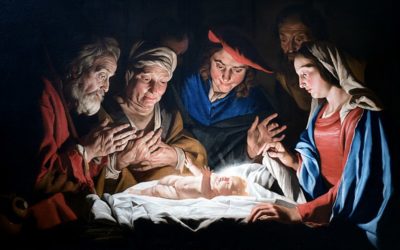The previous Come, Follow Me lesson focused on Doctrine and Covenants 37–40, a flurry of revelations received between December 30, 1830, and January 6, 1831. After that, nearly a month passed before Joseph Smith received the revelation that is now section 41 of the Doctrine and Covenants. During that wintery month, Joseph and Emma traveled the roughly 275 miles from where they were living in New York to Kirtland, Ohio, which with their arrival would become the Church’s new headquarters.
Doctrine and Covenants 41
The first issue Joseph and Emma faced on their arrival was where to live. They secured temporary quarters but needed someplace to stay where Joseph could conduct Church business and Emma, pregnant with twins, could be comfortable.
According to John Whitmer, who arrived before them, a man named Leman Copley of Thompson Township, some distance east of Kirtland, asked Joseph Smith, Sidney Rigdon, and their families “to live with him & he would furnish them houses & provisions &c.” On February 4, 1831, Joseph received a revelation that responded to this offer and also provided direction to Sidney Rigdon and Edward Partridge, who had gone to New York to meet the Prophet and returned to Ohio when he made the journey.
The Lord declared “that my servant Joseph Smith, Jun., should have a house built, in which to live and translate” (verse 7). It would take some three years before this commandment was fulfilled, and in the meantime, Joseph and Emma went to live with Newel K. and Elizabeth Ann Whitney, who would become their close friends. There they received “every kindness and attention, which could be expected,” especially from Elizabeth. The Whitney’s property was on the Kirtland Flats near an important crossroads and therefore more convenient for Church administration than Leman Copley’s more-distant property.
For more information on the five locations where Joseph and Emma lived while in Ohio, click here.
Although Sidney was from the Kirtland area, he lost his potential housing situation when he joined the Church and left the Protestant congregation that was going to provide a home for him as their minister. In section 41, the Lord told him he “should live as seemeth him good, inasmuch as he keepeth my commandments” (verse 8). He chose not to live with Leman Copley either.
Section 41 called Edward Partridge to be the first bishop of the Church, directing “that he should be appointed by the voice of the church, and ordained.” He had been a prosperous hatter but was now commanded “to leave his merchandise and to spend all his time in the labors of the church; to see to all things as it shall be appointed unto him in my laws in the day that I shall give them. And this because his heart is pure before me, for he is like unto Nathanael of old, in whom there is no guile.” (Verses 9–10.)
For more on this history of this section, click here.
Doctrine and Covenants 42
In section 41, the Lord commanded the elders of the Church to “assemble yourselves together to agree upon my word” (verse 2), promising them that “by the prayer of your faith ye shall receive my law, that ye may know how to govern my church and have all things right before me” (verse 3). Receiving the Lord’s law had been one of the major purposes of moving to Ohio. In section 38:32, the Lord had said, “Wherefore, for this cause I gave unto you the commandment that ye should go to the Ohio; and there I will give unto you my law.”
It was important that the Saints kept the law of God that would be revealed. In section 41:5, the Lord explained, “He that receiveth my law and doeth it, the same is my disciple; and he that saith he receiveth it and doeth it not, the same is not my disciple, and shall be cast out from among you.”
Obeying the commandment, several elders met on February 9 and 23, 1831, and Joseph received what is now section 42, known among early Church members as “the Law.” “Hearken, O ye elders of my church, who have assembled yourselves together in my name, even Jesus Christ the Son of the living God, the Savior of the world,” the Lord declared to them. “Hearken and hear and obey the law which I shall give unto you.” (Verses 1–2.)
Proclaiming the Gospel
The verses of the revelation provide the Lord’s laws on specific topics, one of which was missionary work. It called upon them to “go forth in the power of my Spirit, preaching my gospel, two by two, in my name, lifting up your voices as with the sound of a trump, declaring my word like unto angels of God” (verse 6). “My servants shall be sent forth to the east and to the west, to the north and to the south” (verse 63), the Lord declared, telling the converted “to flee . . . in consequence of that which is coming on the earth” (verse 64).
The missionaries were to call people to repentance and baptism, declaring “the kingdom of heaven is at hand” (verse 7). When they found people who accepted them, they were to “build up my church in every region—until the time shall come when it shall be revealed unto you from on high, when the city of the New Jerusalem shall be prepared, that ye may be gathered in one, that ye may be my people and I will be your God” (verses 8–9).
Rules for Preaching
Some verses supplement earlier revelations by providing rules or guidelines for preaching. First, no one was “to go forth to preach my gospel, or to build up my church, except he be ordained by some one who has authority, and it is known to the church that he has authority and has been regularly ordained by the heads of the church” (verse 11).
In all of the teaching in the Church, both to members and nonmembers, the Church officers were to teach from the scriptures “as they shall be directed by the Spirit” (verses 12–13). They would obtain the Spirit “by the prayer of faith; and if ye receive not the Spirit ye shall not teach” (verse 14). When they received the Spirit, they were to “speak and prophesy” as inspired to do so (verse 16).
Laws of the Gospel
The Articles and Covenants of the Church, now section 20 of the Doctrine and Covenants, provided a constitution or basic handbook of the Church with basic rules. The Lord supplemented these rules in section 42 by repeating the Ten Commandments, as interpreted and refined by the Savior in the New Testament, together with rules of discipline for those who proved disobedient (verses 18–29, 74–93).
Before Joseph arrived in Kirtland, some members there tried to live with all property in common as described in Acts 2:42–45 and 4:32–35. John Whitmer wrote, “The disciples had all things common, and were going to destruction very fast as to temporal things: for they considered from reading the scripture that what belonged to a brother belonged to any of the brethren, therefore they would take each others clothes and other property and use it without leave: which brought on confusion and disappointments: for they did not understand the scripture.”
The Lord corrected this notion, saying, “Thou shalt not take thy brother’s garment; thou shalt pay for that which thou shalt receive of thy brother” (verse 54).
Helping the Poor and Needy
But Church members also needed to “remember the poor, and consecrate of thy properties for their support” (verse 30). The Lord laid out a consecration plan for doing so (verses 31–34). “If thou obtainest more than that which would be for thy support, thou shalt give it into my storehouse, that all things may be done according to that which I have said” (verse 55).
Providing Means for the Lord’s Work to Go Forward
Consecrations by the members would also be used “for the purpose of purchasing lands for the public benefit of the church, and building houses of worship, and building up of the New Jerusalem which is hereafter to be revealed” (verse 35). The Lord’s “covenant people” would gather to His temple to prepare for His coming and “for the salvation of my people” (verse 36). Over time, everyone would receive a stewardship (verses 71–73).
Preparing for the Lord and His Temple
To prepare themselves, Church members needed to repent of their sins and consecrate their means (verse 37–39). They were to avoid pride and let their “garments be plain, and their beauty the beauty of the work of thine own hands,” doing “all things” “in cleanliness before me” (verses 40–41). They were to avoid idleness (verse 42), heal the sick through faith and proper nurturing (verses 42–44, 48–52), and “live together in love, insomuch that thou shalt weep for the loss of them that die” (verse 45). Sinners would experience a bitter death, but “those that die in me shall not taste of death, for it shall be sweet unto them” (verse 46–47).
Joseph’s New Translation of the Bible
Joseph was to continue in his stewardship as prophet (verse 53). “Thou shalt ask,” he was told, “and my scriptures shall be given as I have appointed, and they shall be preserved in safety” (verse 56). Church members were understandably curious to know about the revelations he was receiving during the translation process, perhaps to the point of bothering him so much that he couldn’t get his work done. “Hold thy peace concerning them,” the Lord directed him, “and not teach them until ye have received them in full. . . . Then ye shall teach them unto all men; for they shall be taught unto all nations, kindreds, tongues and people.” (Verses 57–58.)
The members of the Church were to take what had “been given unto thee in my scriptures for a law, to be my law to govern my church,” with those who obeyed that law being saved, and anyone who does not being “damned if he so continue” (verses 59–60).
Revelations Hinting of a Temple
“If thou shalt ask,” Joseph was told, “thou shalt receive revelation upon revelation, knowledge upon knowledge, that thou mayest know the mysteries and peaceable things—that which bringeth joy, that which bringeth life eternal” (verse 61). If he asked, the Lord promised, “it shall be revealed unto you in mine own due time where the New Jerusalem shall be built” (verse 62). These verses hinted of a temple to come, as did other verses. “For unto you it is given to know the mysteries of the kingdom, but unto the world it is not given to know them” (verse 65), the Lord said. “And ye shall hereafter receive church covenants, such as shall be sufficient to establish you, both here and in the New Jerusalem” (verse 67).
For more on the history of this section, click here and here.
Doctrine and Covenants 43
Just as the Hiram Page seer stone incident had led members astray in New York before a revelation corrected the errant members, the new Church members in Kirtland before Joseph’s arrival went overboard in seeking spiritual manifestations, some of which became extreme, and the revelation that is now section 43 helped to correct the problem.
“This ye shall know assuredly—that there is none other appointed unto you to receive commandments and revelations until he be taken, if he abide in me” (verse 3), the Lord taught the Saints. To avoid deception, they were to ignore purported revelations from those without authority and instead “teach those revelations which you have received and shall receive through him whom I have appointed” (verses 4–7).
When the members got together, they were to “instruct and edify each other” on “how to act and direct my church” and “how to act upon the points of my law and commandments, which I have given” (verse 8). By doing so, they would “become instructed in the law of my church, and be sanctified,” binding themselves “to act in all holiness before me” (verse 9).
They were to sustain the prophet in his work that they might obtain “the mysteries of the kingdom” through him (verses 10–14).
When they went forth to preach, they were not “to be taught” by those they visited but rather “to teach the children of men the things which I have put into your hands by the power of my Spirit” (verse 15). Those who obeyed would “be taught from on high.” Indeed, if they they sanctified themselves as instructed, they would be “endowed with power” (verse 16), the other reason they were sent to Ohio (see Doctrine and Covenants 38:32).
For more on the history of this section, click here.
Doctrine and Covenants 44
In the latter part of February 1831, after missionaries had been out preaching for a while, the Lord gave the revelation that is now section 44 of the Doctrine and Covenants. In it, the Lord directed “that the elders of my church should be called together, from the east and from the west, and from the north and from the south, by letter or some other way” for a conference (verse 1). This would be a general priesthood conference in which further refinements would be made in the growing Church and probably refers to the monumental conference held on June 6 of that year.
The Lord promised those who came to the conference “that inasmuch as they are faithful, and exercise faith in me, I will pour out my Spirit upon them” (verse 2). In many ways, this meeting was like the mission conferences to which missionaries all over the world are invited today to strengthen and prepare them on a regular basis to perform their missionary service.
After attending the conference, the Lord promised, “they shall go forth into the regions round about, and preach repentance unto the people,” leading to many conversions (verses 3–4). With many of the new converts gathering to Ohio, the Lord also reminded the Saints again to “visit the poor and the needy and administer to their relief” (verse 6).
For more on the history of this section, click here.
(Photo credit for image at the top of this page: Edward Partridge, steel engraving, public domain, from https://upload.wikimedia.org/wikipedia/commons/e/e5/Edward_Partridge_Sr.gif [accessed April 18, 2021].)



